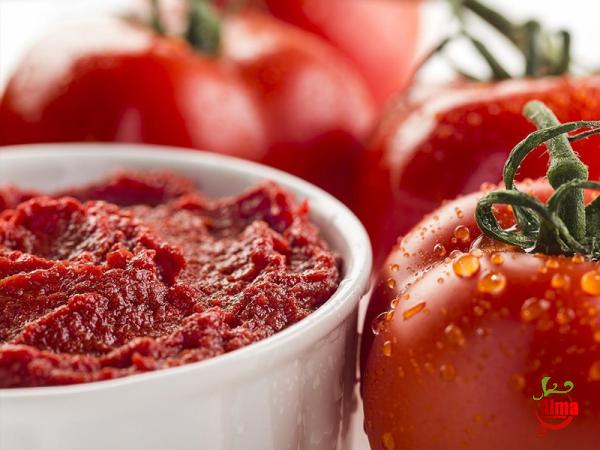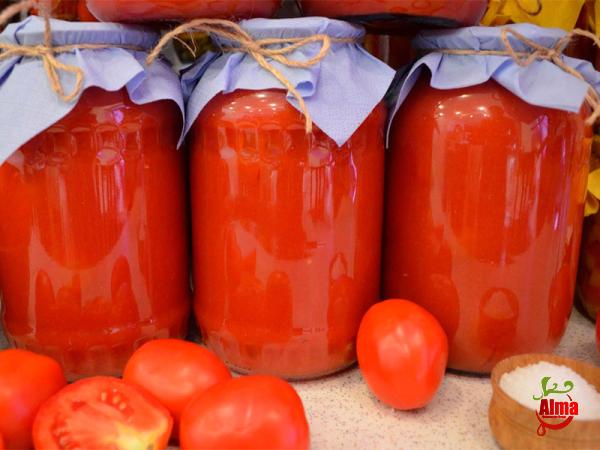A Comprehensive Guide to Organic Tomato Sauce: Health Benefits, Production, and Popular Brands Introduction: Organic tomato sauce has become increasingly popular in recent years as consumers seek healthier and more sustainable food options. With its delicious taste, rich flavor, and numerous health benefits, organic tomato sauce has become a staple in many kitchens worldwide. This article provides an in-depth summary of organic tomato sauce, covering its health benefits, production methods, and some popular brands available in the market. Health Benefits of Organic Tomato Sauce: 1. Antioxidant-Rich: Organic tomato sauce is loaded with antioxidants like lycopene and vitamin C, which help neutralize harmful free radicals in the body. These antioxidants contribute to a reduced risk of chronic diseases, such as heart disease and certain types of cancer. 2. Nutrient-Dense: Tomatoes used in organic tomato sauce are packed with essential vitamins and minerals like potassium, iron, and vitamin K. These nutrients support overall health and immune function. 3. Heart-Healthy: Organic tomato sauce contains a high concentration of lycopene, a powerful antioxidant that has been linked to a decreased risk of heart disease. Lycopene helps prevent oxidative stress and inflammation, two major contributors to cardiovascular issues. 4. Weight Management: Organic tomato sauce is low in calories and fat while being high in fiber. Fiber promotes feelings of fullness and can help regulate appetite, making it a valuable tool in managing weight.

tomato paste
 Production Methods of Organic Tomato Sauce: 1. Organic Farming Practices: Organic tomato sauce is made from tomatoes grown using organic farming methods. These practices exclude the use of synthetic fertilizers, pesticides, and genetically modified organisms (GMOs). Instead, organic farmers rely on natural alternatives like compost, crop rotation, and beneficial insects to maintain soil health and combat pests. 2. Sustainable Packaging: Many organic tomato sauce brands prioritize sustainable packaging materials that minimize environmental impact. This includes using glass jars instead of plastic containers, which are eco-friendly and help preserve the freshness of the sauce. 3. Minimal Processing: Organic tomato sauce is typically produced using minimal processing techniques to retain the natural flavors and nutrients of the tomatoes. This may involve gently simmering the tomatoes with minimal additional ingredients such as spices, herbs, or garlic. Popular Organic Tomato Sauce Brands: 1. Muir Glen: Muir Glen offers a range of organic tomato sauces made from vine-ripened tomatoes, carefully selected herbs, and spices. Their sauces are known for their rich flavor and smooth texture. 2. Rao’s Homemade: Rao’s Homemade is a well-known brand that produces premium organic tomato sauces, crafted using traditional Italian recipes. Their sauces are made with high-quality ingredients and cooked slowly in small batches to enhance flavor. 3. Newman’s Own: Newman’s Own offers a variety of organic tomato sauces that are made from vine-ripened tomatoes and organic herbs and spices. The brand is known for its commitment to using quality ingredients and donating a portion of its profits to charitable causes.
Production Methods of Organic Tomato Sauce: 1. Organic Farming Practices: Organic tomato sauce is made from tomatoes grown using organic farming methods. These practices exclude the use of synthetic fertilizers, pesticides, and genetically modified organisms (GMOs). Instead, organic farmers rely on natural alternatives like compost, crop rotation, and beneficial insects to maintain soil health and combat pests. 2. Sustainable Packaging: Many organic tomato sauce brands prioritize sustainable packaging materials that minimize environmental impact. This includes using glass jars instead of plastic containers, which are eco-friendly and help preserve the freshness of the sauce. 3. Minimal Processing: Organic tomato sauce is typically produced using minimal processing techniques to retain the natural flavors and nutrients of the tomatoes. This may involve gently simmering the tomatoes with minimal additional ingredients such as spices, herbs, or garlic. Popular Organic Tomato Sauce Brands: 1. Muir Glen: Muir Glen offers a range of organic tomato sauces made from vine-ripened tomatoes, carefully selected herbs, and spices. Their sauces are known for their rich flavor and smooth texture. 2. Rao’s Homemade: Rao’s Homemade is a well-known brand that produces premium organic tomato sauces, crafted using traditional Italian recipes. Their sauces are made with high-quality ingredients and cooked slowly in small batches to enhance flavor. 3. Newman’s Own: Newman’s Own offers a variety of organic tomato sauces that are made from vine-ripened tomatoes and organic herbs and spices. The brand is known for its commitment to using quality ingredients and donating a portion of its profits to charitable causes.
Specifications of tomato paste
 4. Amy’s: Amy’s specializes in organic and vegetarian food products, including tomato sauces. Their organic tomato sauces are made from ripe, organic tomatoes and a blend of organic herbs. Amy’s sauces cater to various dietary preferences and are often gluten-free and vegan. Conclusion: Organic tomato sauce not only adds a burst of flavor to meals but also comes with a host of health benefits. Its antioxidant content, nutrient density, and heart-healthy properties make it an excellent choice for health-conscious individuals. With a wide range of available brands, consumers can choose organic tomato sauce options that align with their values and preferences. By opting for organic tomato sauce, consumers can enjoy a delicious, sustainable, and nutritious addition to their culinary repertoire.I. The Growing Demand for Organic Tomato Sauce The demand for organic tomato sauce has been steadily increasing as consumers become more health-conscious and environmentally aware. The rise in organic food consumption can be attributed to several factors, including concerns over pesticide residues in conventionally grown crops, a desire for fresh and natural flavors, and the belief that organic farming practices are more sustainable. II. Targeting Health-Conscious Consumers Organic tomato sauce manufacturers have recognized the growing demand for healthier food options and have positioned their products to cater to health-conscious consumers. These individuals value organic ingredients, minimal processing, and a lack of artificial additives or preservatives. By marketing their tomato sauces as organic and emphasizing the health benefits, manufacturers have successfully tapped into this market segment. III. Differentiation through Sustainable Practices In addition to health considerations, consumers are becoming increasingly conscious of environmental sustainability. Organic tomato sauce manufacturers can differentiate themselves by implementing sustainable practices throughout their production processes. This includes using eco-friendly packaging materials, reducing waste, and supporting ethical sourcing practices. By showcasing their commitment to the environment, brands can attract environmentally conscious consumers seeking sustainable options. IV. Packaging Considerations and Innovations Packaging plays a crucial role in attracting consumers and preserving the quality of organic tomato sauce. Many organic tomato sauce brands now opt for glass jars instead of plastic containers. Glass is considered a more sustainable option as it is recyclable and does not leach harmful chemicals into the sauce. Additionally, glass jars help maintain the freshness of the sauce by preventing flavor degradation and protecting against light exposure. V. Marketing Organic Tomato Sauce as a Versatile Ingredient Organic tomato sauce manufacturers have recognized the value of promoting their products as versatile ingredients. Tomato sauce can be used as a base for various dishes such as pasta sauces, pizza toppings, stews, and soups. By highlighting the versatility of their products, brands can appeal to consumers seeking convenience and culinary creativity in their cooking endeavors. VI. Capitalizing on the Rise of Plant-Based Diets The growing popularity of plant-based diets presents an opportunity for organic tomato sauce manufacturers. Many consumers following vegetarian, vegan, or flexitarian diets rely on tomato-based sauces to add flavor and depth to their plant-based meals. By marketing their products as plant-based and suitable for various dietary preferences, organic tomato sauce brands can capture a significant share of this expanding market.
4. Amy’s: Amy’s specializes in organic and vegetarian food products, including tomato sauces. Their organic tomato sauces are made from ripe, organic tomatoes and a blend of organic herbs. Amy’s sauces cater to various dietary preferences and are often gluten-free and vegan. Conclusion: Organic tomato sauce not only adds a burst of flavor to meals but also comes with a host of health benefits. Its antioxidant content, nutrient density, and heart-healthy properties make it an excellent choice for health-conscious individuals. With a wide range of available brands, consumers can choose organic tomato sauce options that align with their values and preferences. By opting for organic tomato sauce, consumers can enjoy a delicious, sustainable, and nutritious addition to their culinary repertoire.I. The Growing Demand for Organic Tomato Sauce The demand for organic tomato sauce has been steadily increasing as consumers become more health-conscious and environmentally aware. The rise in organic food consumption can be attributed to several factors, including concerns over pesticide residues in conventionally grown crops, a desire for fresh and natural flavors, and the belief that organic farming practices are more sustainable. II. Targeting Health-Conscious Consumers Organic tomato sauce manufacturers have recognized the growing demand for healthier food options and have positioned their products to cater to health-conscious consumers. These individuals value organic ingredients, minimal processing, and a lack of artificial additives or preservatives. By marketing their tomato sauces as organic and emphasizing the health benefits, manufacturers have successfully tapped into this market segment. III. Differentiation through Sustainable Practices In addition to health considerations, consumers are becoming increasingly conscious of environmental sustainability. Organic tomato sauce manufacturers can differentiate themselves by implementing sustainable practices throughout their production processes. This includes using eco-friendly packaging materials, reducing waste, and supporting ethical sourcing practices. By showcasing their commitment to the environment, brands can attract environmentally conscious consumers seeking sustainable options. IV. Packaging Considerations and Innovations Packaging plays a crucial role in attracting consumers and preserving the quality of organic tomato sauce. Many organic tomato sauce brands now opt for glass jars instead of plastic containers. Glass is considered a more sustainable option as it is recyclable and does not leach harmful chemicals into the sauce. Additionally, glass jars help maintain the freshness of the sauce by preventing flavor degradation and protecting against light exposure. V. Marketing Organic Tomato Sauce as a Versatile Ingredient Organic tomato sauce manufacturers have recognized the value of promoting their products as versatile ingredients. Tomato sauce can be used as a base for various dishes such as pasta sauces, pizza toppings, stews, and soups. By highlighting the versatility of their products, brands can appeal to consumers seeking convenience and culinary creativity in their cooking endeavors. VI. Capitalizing on the Rise of Plant-Based Diets The growing popularity of plant-based diets presents an opportunity for organic tomato sauce manufacturers. Many consumers following vegetarian, vegan, or flexitarian diets rely on tomato-based sauces to add flavor and depth to their plant-based meals. By marketing their products as plant-based and suitable for various dietary preferences, organic tomato sauce brands can capture a significant share of this expanding market.
buy tomato paste
 VII. Expanding Product Range and Flavor Profiles To cater to diverse consumer preferences, organic tomato sauce manufacturers are expanding their product ranges beyond traditional marinara or tomato-based sauces. Brands now offer options such as spicy Arrabbiata sauce, herb-infused tomato sauce, or even tomato-based curry sauces. By diversifying their flavor profiles, manufacturers can appeal to a wider audience and accommodate different culinary preferences. VIII. Partnering with Local Farmers and Supporting Sustainable Agriculture Collaborating with local farmers and supporting sustainable agriculture practices can be a strategic move for organic tomato sauce manufacturers. By establishing partnerships, manufacturers can ensure a steady supply of high-quality organic tomatoes while supporting small-scale farmers and local economies. This approach resonates with consumers who value transparency, traceability, and socially responsible business practices. IX. Investing in Research and Development for New Product Innovations In a competitive market, continuous innovation is key to maintaining a competitive edge. Organic tomato sauce manufacturers are investing in research and development to create new product offerings that meet the evolving demands of consumers. This includes exploring unique flavor profiles, experimenting with different tomato varieties, and developing organic options for specialty diets, such as gluten-free or low-sodium sauces. X. Building Consumer Trust and Brand Loyalty To succeed in the organic tomato sauce market, manufacturers must focus on building consumer trust and brand loyalty. This can be achieved through transparent labeling, clear communication of organic certifications, and engaging with consumers through social media platforms or recipe blogs. By establishing an emotional connection with consumers and consistently delivering high-quality products, organic tomato sauce brands can foster long-term loyalty and advocacy. XI. Overcoming Pricing Challenges One of the challenges faced by organic tomato sauce manufacturers is the perception that organic products are more expensive than their conventional counterparts. To overcome this hurdle, manufacturers can educate consumers about the value and benefits of organic tomato sauce, highlighting factors such as superior taste, environmental sustainability, and health advantages. By effectively communicating these benefits, brands can justify the higher price points and convince consumers that organic tomato sauce is worth the investment. XII. Embracing Global Market Opportunities As the global demand for organic food continues to grow, organic tomato sauce manufacturers can capitalize on international market opportunities. By exploring export opportunities and adapting their products to suit regional tastes and preferences, brands can expand their reach and tap into new customer segments. Partnering with distributors or retailers with a strong presence in international markets can facilitate this expansion and increase brand visibility on a global scale. Conclusion: The market for organic tomato sauce is thriving as consumers become more health-conscious and environmentally aware. By offering superior health benefits, prioritizing sustainable practices, and targeting specific consumer segments, organic tomato sauce manufacturers can set themselves apart in this competitive market. By leveraging innovation, building consumer trust, and capitalizing on emerging trends, organic tomato sauce brands have the opportunity to secure their position in the growing organic food industry.
VII. Expanding Product Range and Flavor Profiles To cater to diverse consumer preferences, organic tomato sauce manufacturers are expanding their product ranges beyond traditional marinara or tomato-based sauces. Brands now offer options such as spicy Arrabbiata sauce, herb-infused tomato sauce, or even tomato-based curry sauces. By diversifying their flavor profiles, manufacturers can appeal to a wider audience and accommodate different culinary preferences. VIII. Partnering with Local Farmers and Supporting Sustainable Agriculture Collaborating with local farmers and supporting sustainable agriculture practices can be a strategic move for organic tomato sauce manufacturers. By establishing partnerships, manufacturers can ensure a steady supply of high-quality organic tomatoes while supporting small-scale farmers and local economies. This approach resonates with consumers who value transparency, traceability, and socially responsible business practices. IX. Investing in Research and Development for New Product Innovations In a competitive market, continuous innovation is key to maintaining a competitive edge. Organic tomato sauce manufacturers are investing in research and development to create new product offerings that meet the evolving demands of consumers. This includes exploring unique flavor profiles, experimenting with different tomato varieties, and developing organic options for specialty diets, such as gluten-free or low-sodium sauces. X. Building Consumer Trust and Brand Loyalty To succeed in the organic tomato sauce market, manufacturers must focus on building consumer trust and brand loyalty. This can be achieved through transparent labeling, clear communication of organic certifications, and engaging with consumers through social media platforms or recipe blogs. By establishing an emotional connection with consumers and consistently delivering high-quality products, organic tomato sauce brands can foster long-term loyalty and advocacy. XI. Overcoming Pricing Challenges One of the challenges faced by organic tomato sauce manufacturers is the perception that organic products are more expensive than their conventional counterparts. To overcome this hurdle, manufacturers can educate consumers about the value and benefits of organic tomato sauce, highlighting factors such as superior taste, environmental sustainability, and health advantages. By effectively communicating these benefits, brands can justify the higher price points and convince consumers that organic tomato sauce is worth the investment. XII. Embracing Global Market Opportunities As the global demand for organic food continues to grow, organic tomato sauce manufacturers can capitalize on international market opportunities. By exploring export opportunities and adapting their products to suit regional tastes and preferences, brands can expand their reach and tap into new customer segments. Partnering with distributors or retailers with a strong presence in international markets can facilitate this expansion and increase brand visibility on a global scale. Conclusion: The market for organic tomato sauce is thriving as consumers become more health-conscious and environmentally aware. By offering superior health benefits, prioritizing sustainable practices, and targeting specific consumer segments, organic tomato sauce manufacturers can set themselves apart in this competitive market. By leveraging innovation, building consumer trust, and capitalizing on emerging trends, organic tomato sauce brands have the opportunity to secure their position in the growing organic food industry.









Your comment submitted.